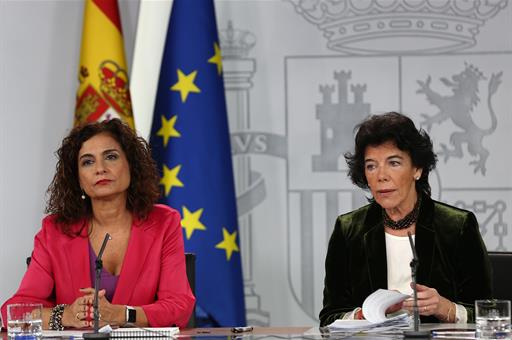Council of Ministers
Government makes progress on Budget to strengthen Welfare State
Council of Ministers - 2018.10.11
Moncloa Palace, Madrid
The Government Spokesperson, Isabel Celaá, highlighted, following the Council of Ministers, the agreement signed between the President of the Government, Pedro Sánchez, and the General Secretary of Unidos Podemos, Pablo Iglesias, on the National Budget for 2019. On Monday, the base budgetary plan will be approved at an extraordinary Cabinet meeting to be sent to Brussels the same day.
This agreement, claimed Isabel Celaá, "underscores the agenda for change implemented by the government to recover rights overlooked under the excuse of the economic crisis and to make progress on strengthening the Welfare State". The Government Spokesperson pointed out that the document is "the work principle", since the approval of the Budget requires the backing of more parliamentary forces. In this regard, she called for the Regional Government of Catalonia and the forces that back it to "unblock the stalemate in the Catalan institutions" and to sign up to the agreement, since "this will be a highly beneficial project for the whole of society, including in Catalonia".
Social and sustainable Budget
The Minister for the Treasury, María Jesús Montero, argued that the agreement "provides for courageous and sustainable public accounts" and meets commitments to Spanish citizens and European partners.
The draft Budget, she declared, returns rights by overturning the cuts adopted during the crisis, boosts the change of productive model to enhance competitiveness and improves democratic quality. It also enables urgent solutions to daily problems such as rental prices, the electricity bill and the delay in receiving public benefits.
Pensions, education and long-term care
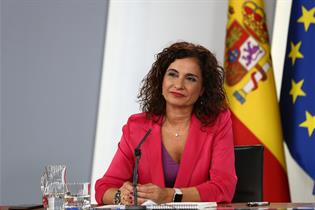 Pool Moncloa/César P.SendraThe Minister for the Treasury remarked that the agreement contains the pension increase in line with the Consumer Price Index (CPI) rise, both this year and next. Pensioners, she announced, will receive a compensatory payment in the first quarter of 2019 in the event that, at the end of 2018, prices have risen more than forecast. In addition, minimum pensions and con-contributory pensions will rise by 3% in 2019.
Pool Moncloa/César P.SendraThe Minister for the Treasury remarked that the agreement contains the pension increase in line with the Consumer Price Index (CPI) rise, both this year and next. Pensioners, she announced, will receive a compensatory payment in the first quarter of 2019 in the event that, at the end of 2018, prices have risen more than forecast. In addition, minimum pensions and con-contributory pensions will rise by 3% in 2019.
On another note, the agreement overturns the cuts in education: it increases study grants to 536 million euros for the academic year 2019/2020, reduces university fees to the levels they stood at before the crisis and allocates 50 million euros to free school materials. Furthermore, it gradually reduces "pharmaceutical co-payments". As of 2019 this measure will begin by benefitting some 5 million pensioners and 1.8 million families with limited economic resources. Long-term care will have a 40% rise in its allocation compared with 2018.
Minimum wage, equality and housing
The document contains measures relating to equality and balance between work and family life. María Jesús Montero underlined the progressive aligning of paternity and maternity leave, "a giant leap forward in attaining real equality". This leave will be non-transferable, which will help contribute towards reducing the wage gap between men and women and the difficulties that the latter suffer in access to the job market, she said.
At a labour level, the agreement provides for an increase in the minimum wage (Spanish acronym: SMI) of 22.3% to 900 euros in 14 payments, which amounts to annual remuneration of 12,600 euros. María Jesús Montero stated that this is the largest rise in the minimum wage in any year and will particularly benefit female workers.
As regards housing, the agreement seeks to moderate the rise in rental prices by extending the obligatory extension period of rental contracts from three to five years and incorporating some 20,000 properties into the market at affordable prices. María Jesús Montoro stated that "conditions will also be created to facilitate cohabitation and protect urban areas that are particularly affected by the phenomenon of tourist apartments".
Other measures quoted by the minister related to the State Pact to Combat Gender-Based Violence - with a 10% increase to fully finance it - the fight against energy poverty and child poverty - the benefit for dependent children will be increased - the 6.7% rise in investment in R&D+i, and the "final boost" to ensuring universal education for children in their first three years of their lives.
New taxation
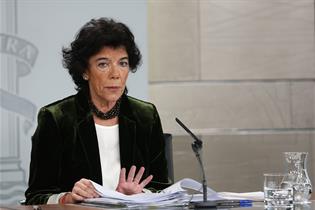 Pool Moncloa/César P.SendraThe minister stressed that these measures are compatible with fiscal consolidation, thanks to higher revenue as a result of the economic cycle, "and also as a result of the new tax regime proposed for the 21st Century". The goal, she stated, is for "those that have greater economic capacity to provide more so that everyone can enjoy a stronger Welfare State, the most needy can be better protected and wealth can be redistributed".
Pool Moncloa/César P.SendraThe minister stressed that these measures are compatible with fiscal consolidation, thanks to higher revenue as a result of the economic cycle, "and also as a result of the new tax regime proposed for the 21st Century". The goal, she stated, is for "those that have greater economic capacity to provide more so that everyone can enjoy a stronger Welfare State, the most needy can be better protected and wealth can be redistributed".
Accordingly, the agreement provides for a rise in Personal Income Tax (Spanish acronym: IRPF) on the highest incomes: the rate rises two points for salaries in excess of 130,000 euros and four points for those in excess of 300,000 euros. This rise, specified María Jesús Montoro, will only affect 0.5% of taxpayers. "99.5% of citizens will not pay more Personal Income Tax and yet, the safety net will help ensure greater equality". Capital Gains Tax will rise by four points as from the sum of 140,000 euros.
The government will also ask for a greater contribution from large corporations by establishing a minimum rate of 15% on the Corporate Income Tax base, while the rate will drop from 25% to 23% for companies that invoice less than 1 million euros. Furthermore, in line with the proposals made by the European Commission, a Financial Transaction Tax will be created to tax the purchase and sale of shares in large listed companies, and another tax on certain digital services that will affect companies with invoicing of over 750 million euros worldwide and 3 million euros in Spain.
This agreement will lower VAT on feminine hygiene products and veterinary services and will incorporate measures to combat tax fraud, such as a legal ban on tax amnesties.
Flooding in Majorca
Isabel Celaá began the press briefing by expressing the government's solidarity with the families of the victims and residents of Sant Llorenç de Cardassar following the flooding of the town in Majorca.
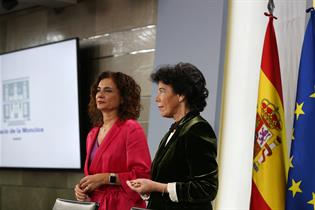 Pool Moncloa/César P.SendraThe Government Spokesperson announced that the Council of Ministers has started the administrative procedures to declare the district of Levante de Mallorca as an area seriously affected by a civil protection emergency. This procedure, she stated, will be finalised next Friday at the Council of Ministers, and will facilitate "access to extraordinary aid measures, economic assistance, tax breaks and compensation for those affected", whether families, businesses or companies.
Pool Moncloa/César P.SendraThe Government Spokesperson announced that the Council of Ministers has started the administrative procedures to declare the district of Levante de Mallorca as an area seriously affected by a civil protection emergency. This procedure, she stated, will be finalised next Friday at the Council of Ministers, and will facilitate "access to extraordinary aid measures, economic assistance, tax breaks and compensation for those affected", whether families, businesses or companies.
The government, she added, wants to ensure that "those affected will receive the necessary aid and that this also happens as quickly as possible", to help aid "the recovery from the consequences of this tragedy" as quickly as possible.
Improvements in non-university teaching
The Minister for Education and Vocational Training and Government Spokesperson took stock of the approval of the Draft Bill to improve teaching conditions for non-university education, which will "immediately be submitted for its passage through Parliament".
The draft bill was addressed at the Council of Ministers on 14 September with the aim of eliminating the education cuts introduced under Royal Decree-Law 14/2012.
This will specifically eliminate the increase in the number of pupils per class and the increase in the working day of teachers. In addition, substitute teachers will be appointed as soon as the main teacher goes on leave, without the education centre having to wait 10 days as at present.
The text was presented to teacher trade unions and regional governments and was analysed by the State School Council. It has also been subjected to public consultation and information.
Rural development
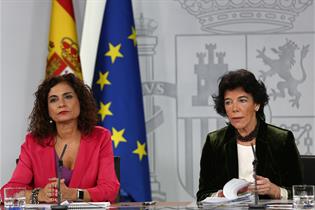 Pool Moncloa/César P.SendraThe Council of Ministers established the terms and conditions to grant subsidies to rural women throughout Spain in order to boost their role in rural development, foster entrepreneurship and incorporate them in economic activity in the countryside.
Pool Moncloa/César P.SendraThe Council of Ministers established the terms and conditions to grant subsidies to rural women throughout Spain in order to boost their role in rural development, foster entrepreneurship and incorporate them in economic activity in the countryside.
The Government Spokesperson specified that these are subsidies to carry out training days and specific activities in order to "ensure that women are catalysts and structural participants" in the rural environment in which they live.
Other agreements adopted by Council of Ministers
- Update of regulation on airport planning of general interest airports.
- Approval of distribution of more than 9 million euros allocated to programmes under the National Drugs Plan to be developed by regional governments.
- Creation of the Commerce Watchdog 4.0 in order to analyse the situation of retail trade in Spain and help it adapt to new technologies.
- Approval of composition and functioning of National Forestry Council.
- Approval of a directive that transposes European regulations on the control of a plague of small harmful insects (the red palm weevil) that nest in palm trees.
Non official translation





